BRICS 250: Merging financial success with sustainable growth in emerging markets
BRICS 250 RANKING Corporate Leaders METHODOLOGY
In a world where sustainable development is increasingly prioritised, the establishment of the BRICS 250 ranking is a contribution to global cooperation and progress, with experts from various countries evaluating and ranking the largest companies from BRICS nations.
The analysis and evaluation of companies are primarily based on their financial and ESG reports. Additionally, only the most reliable data sources have been utilised, including government databases and authoritative international ratings and indices.
The set of evaluation criteria includes market capitalisation, revenue and corporate strategy, as well as the implementation of ESG activities. Particular emphasis is placed on the company’s use of renewable energy, waste management practices, ‘green’ investments and inclusive corporate policies.
This ranking, in itself, serves as a call for greater transparency and accountability in business, as well as proactive measures towards sustainable development. It also offers valuable insights to investors and governments, aiding them in making informed decisions that benefit society and the environment.
Determined by stringent selection criteria, the BRICS 250 features the largest national companies that have a substantial economic and societal impact.
Given the diversity of the BRICS economies, we screened each market to identify the largest and most influential players in each country. Our analysis concentrated on companies with high market capitalization, assuming these entities have the capacity to allocate significant resources towards sustainable policies, with the goal of positively affecting their communities and the environment.
Recognising adherence to ESG principles as equally important as financial performance, we examined each company’s strategy and action in addressing social and environmental challenges. We requested companies to provide specific information about their tangible efforts in this field. We paid special attention to their initiatives aimed at reducing carbon emissions, improving working conditions and enhancing transparency in governance.
This innovative ranking has the potential to reshape corporate approaches to social and environmental responsibility while paving the way for future growth and innovation
BRICS 250 Ranking – 2024 Edition / 1-64
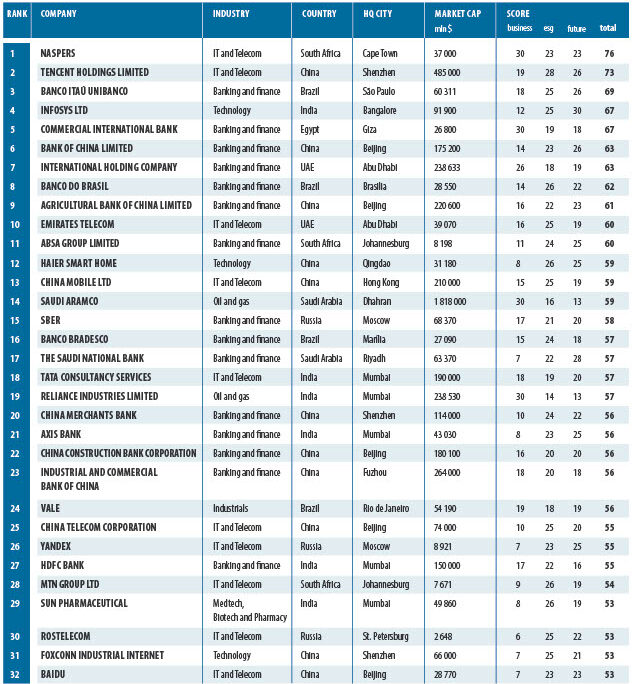
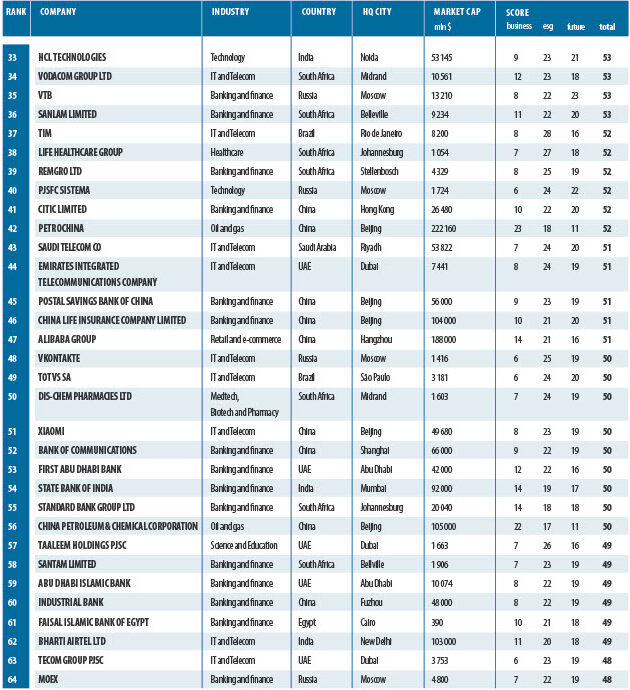
BRICS 250 Ranking – 2024 Edition / 65-125
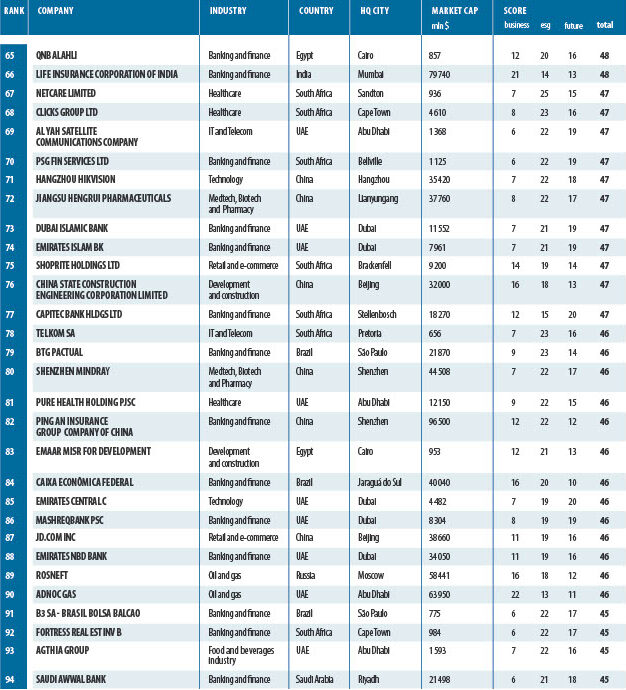
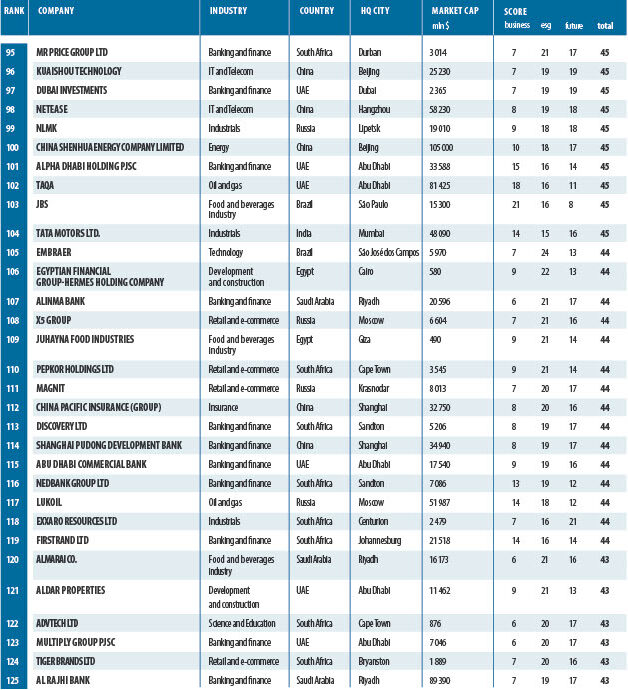
BRICS 250 Ranking – 2024 Edition / 126-189
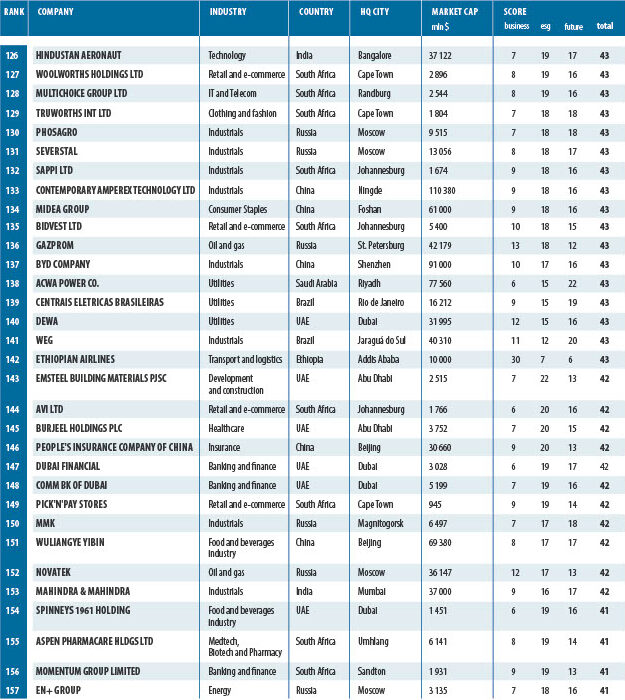
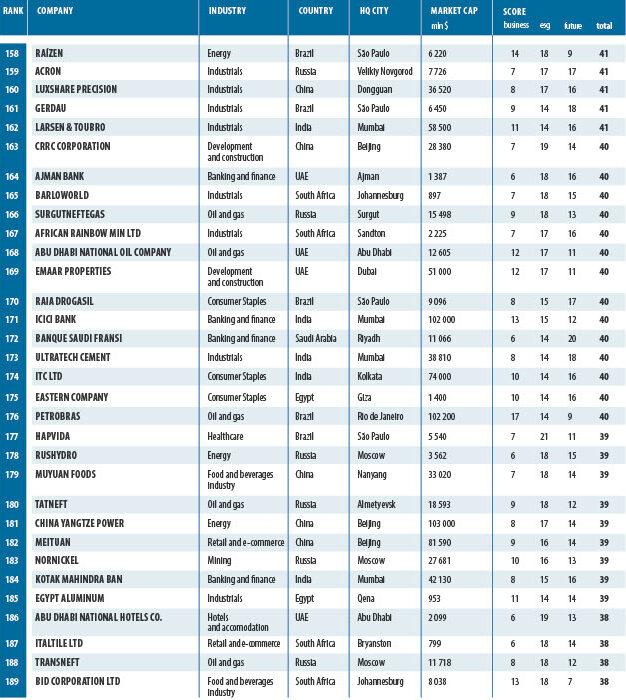
BRICS 250 Ranking – 2024 Edition / 190-250
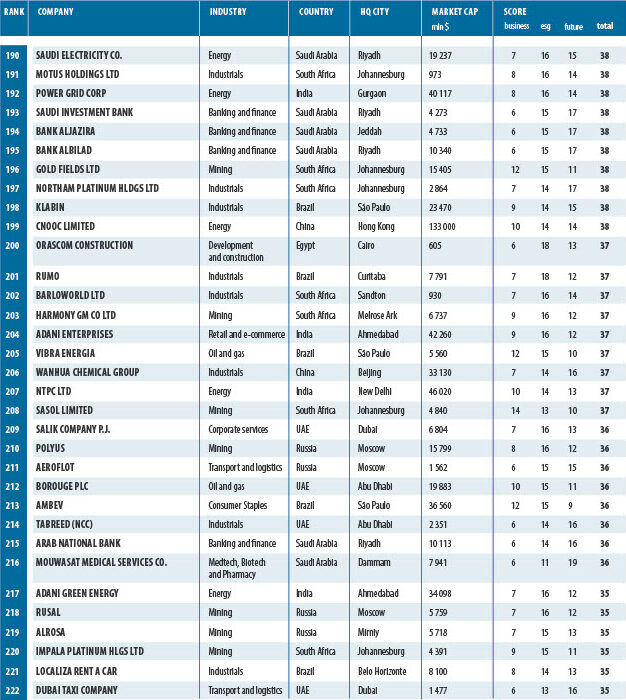
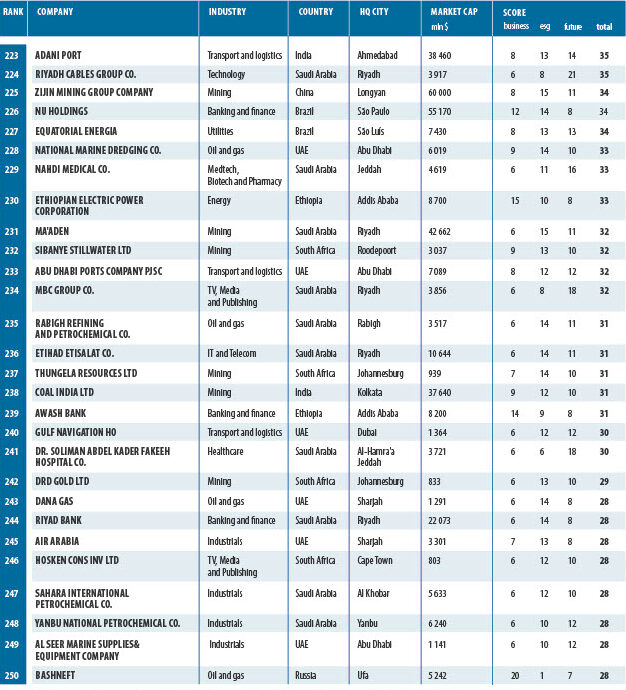
The companies topping the BRICS 250 ranking stand out for their achievements in business and innovation as well as their commitment to ESG across diverse industries—from technology to finance to telecommunications and more. They have established themselves as leaders in their sectors by embracing digital transformation, advancing technologies like AI, fintech, cloud computing and renewable energy, and expanding their global presence through strategic investments and acquisitions. By integrating innovation with sustainability, these companies have not only strengthened their market positions but also contributed to the broader goal of creating a more sustainable and inclusive global economy. Investors might find these companies appealing due to their sustainable growth, diversified assets, and government support. Amid global economic shifts and evolving resource demands, such companies could emerge as pivotal players in shaping future market trends.
BRICS Corporate Leaders
The companies that make a substantial impact on their nations’ well-being, advance the BRICS business ecosystem and actively work towards building more equitable societies are the true heroes of BRICS nations. Let’s examine their experience in combining market progress with care for people and nature.
1 NASPERS
Naspers is a multinational consumer internet group and one of South Africa’s largest companies. Founded in 1915, it has evolved from a local media business into a global internet and technology group, with significant investments in online classifieds, food delivery, fintech and e-commerce platforms. Naspers is notably the largest shareholder in Prosus, a global consumer internet group that holds stakes in companies like Tencent and Delivery Hero. Naspers’ ESG efforts focus on sustainable development and responsible corporate citizenship. The company emphasises reducing its carbon footprint, enhancing data privacy and security, promoting diversity and inclusion, and supporting local communities. Naspers also prioritises good governance, aiming for transparency, accountability and ethical business practices across its operations and investments. Its ESG initiatives are aligned with global sustainability goals, aiming for a positive impact on both society and the environment.
2 TENCENT HOLDINGS LTD.
Tencent Holdings Ltd. is a Chinese multinational conglomerate and one of the world’s largest technology companies. Founded in 1998 and headquartered in Shenzhen, Tencent operates across various sectors including social networking, gaming, fintech, cloud computing and AI. Tencent’s core businesses revolve around its popular social media platform WeChat, its leading online gaming portfolio (featuring titles like Honor of Kings and PUBG Mobile) and its digital payment service WeChat Pay. Tencent is also a significant player in cloud services and artificial intelligence, driving innovation across industries. The company invests extensively in high-tech sectors, including autonomous driving, quantum computing, and healthcare technology, as well as its strategic stakes in global tech giants like Tesla, Spotify, and Snap Inc. Tencent’s ESG policies focus on sustainability, social responsibility and robust governance. The company is committed to reducing its carbon emissions, developing eco-friendly data centres and adopting renewable energy sources. Socially, Tencent invests in education, healthcare and poverty alleviation in China while promoting digital inclusion globally. Its governance strategy emphasises transparency, ethics and compliance with international standards, reflecting its role as a global tech leader.
3 BANCO ITAÚ UNIBANCO
Banco Itaú Unibanco is one of the largest financial institutions in Latin America and a key player in the global banking industry. Headquartered in São Paulo, Brazil, the bank was formed in 2008 through the merger of Banco Itaú and Unibanco. Itaú Unibanco offers a wide range of services including retail, commercial and investment banking, as well as insurance, asset management and credit cards. The bank operates in over 18 countries and serves millions of customers across its digital and physical platforms. The bank is known for its focus on digital transformation, with significant investments in fintech, AI, and blockchain technology to enhance customer experiences and operational efficiency. Itaú Unibanco has a strong commitment to ESG principles. Environmentally, the bank aims to reduce its carbon footprint, finance green projects and support sustainable development in Brazil and beyond. Socially, Itaú Unibanco invests in education, entrepreneurship and social inclusion initiatives, particularly focusing on underserved communities. In terms of governance, the bank prioritises transparency, ethical behaviour and strong corporate governance practices, ensuring that its operations align with global best practices and contribute positively to society and the environment.
WEJ-RESEARCH IN COOPERATION WITH WOD-RESEARCH
Stay informed anytime! Download the World Economic Journal app on the App Store and Google Play.
https://apps.apple.com/kg/app/world-economic-journal-mag/id6702013422
https://play.google.com/store/apps/details?id=com.magzter.worldeconomicjournal

